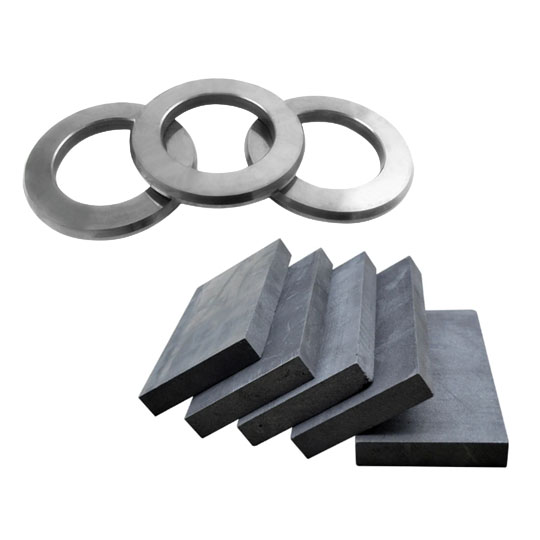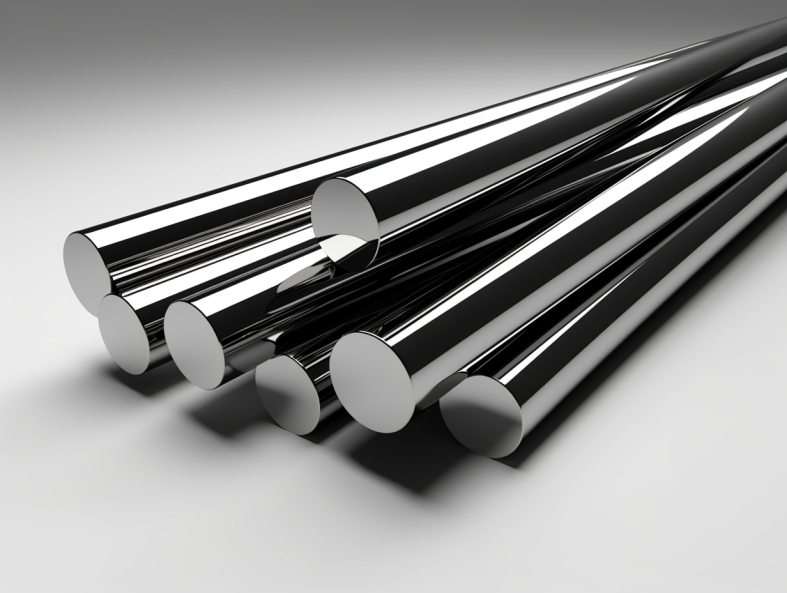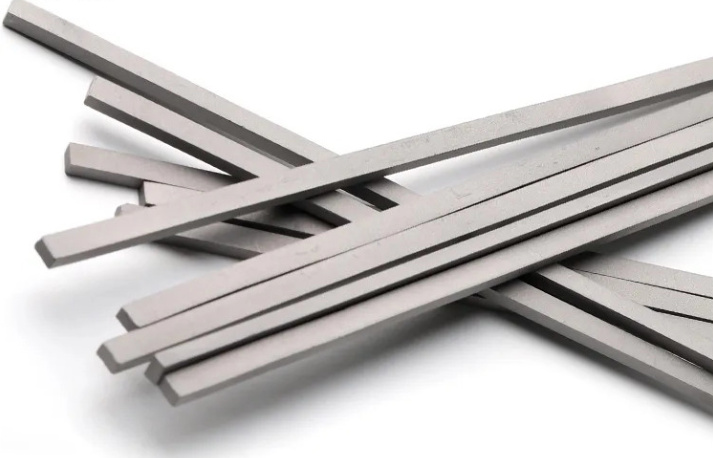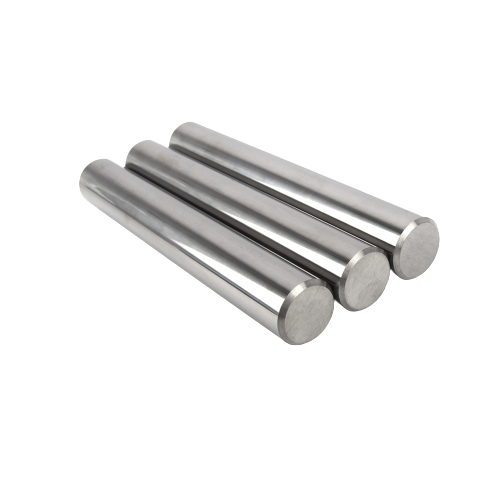최첨단: 텅스텐 카바이드 엔드밀이 재료 제거를 재정의하는 방법
텅스텐 카바이드 엔드 밀 는 절삭 공구 기술의 정점에 서서 다양한 산업 분야의 제조업체가 전례 없는 수준의 정밀도, 효율성 및 공구 수명을 달성할 수 있도록 지원합니다. 놀랍도록 단단하고 내마모성이 뛰어난 텅스텐 카바이드로 팁을 가공한 이 고성능 공구는 경화강과 이색 합금부터 복합재, 심지어 뼈까지 다양한 소재를 가공하는 데 필수적입니다. 이 종합 가이드에서는 텅스텐 카바이드 엔드밀의 구조, 용도, 장점 및 최적의 결과를 위해 고려해야 할 주요 요소를 자세히 살펴보면서 복잡한 텅스텐 카바이드 엔드밀에 대해 설명합니다.
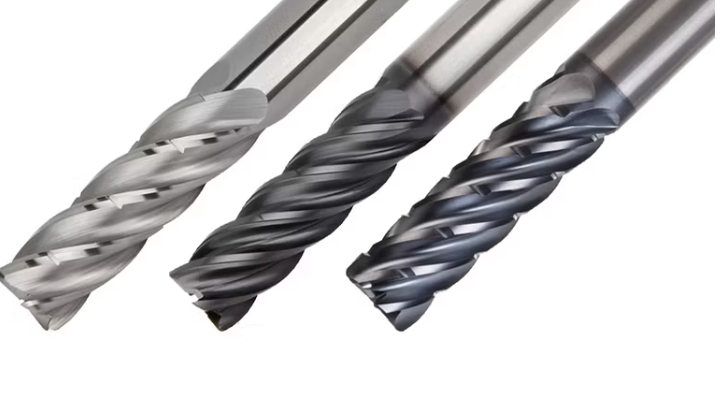
강철 그 이상: 텅스텐 카바이드 엔드밀의 해부학적 구조 이해
구성 요소 및 구성 구조 자세히 살펴보기
- 최첨단: 효율적인 재료 제거를 위해 특정 형상에 맞게 정밀하게 연마된 여러 개의 플루트(절삭날)가 있는 공구의 핵심 부품입니다. 플루트 구성은 특수한 작업을 위한 직선형, 나선형 또는 복잡한 형상 등의 옵션으로 용도에 따라 다양합니다.
- Shank: 원통형 부분은 밀링 머신의 공구 홀더에 단단히 고정되어 작업 중 안정성과 정확한 위치 지정을 보장합니다. 일반적인 샹크 유형에는 웰던, 휘슬 노치 또는 직선 샹크가 있으며, 각각 특정 클램핑 메커니즘을 제공합니다.
- 서브스트레이트: 절삭 날은 일반적으로 경도와 내마모성을 극대화하기 위해 단단한 텅스텐 카바이드로 만들어지지만, 공구의 몸체(기판)는 다른 재료로 만들 수 있습니다:
- 솔리드 카바이드: 까다로운 애플리케이션을 위한 최고의 강성과 성능을 제공하지만 프리미엄 비용이 발생합니다.
- 카바이드 팁 HSS: 비용 효율성을 위한 고속 강철(HSS) 본체와 향상된 절단 성능을 위한 브레이징 텅스텐 카바이드 팁이 결합되어 있습니다.
- 코팅: 텅스텐 카바이드 엔드밀은 성능을 더욱 향상시키기 위해 첨단 증착 기술을 사용하여 특수 코팅을 적용하는 경우가 많습니다. 이러한 코팅은 공구 수명을 늘리고 표면 조도를 개선하며 절삭 속도를 높입니다. 인기 있는 코팅 옵션은 다음과 같습니다:
- 질화 티타늄(TiN): 경도와 내마모성이 향상되어 독특한 골드 색상을 제공합니다.
- 티타늄 카보나이트(TiCN): TiN보다 훨씬 높은 경도와 내마모성을 제공하며, 종종 더 진한 회색 또는 검은색을 띠기도 합니다.
- 알루미늄 질화 티타늄(AlTiN): 내열성이 뛰어나 고속 가공 및 절단하기 어려운 재료에 이상적입니다.
혼란을 헤쳐나가기: 텅스텐 카바이드 엔드밀의 종류와 응용 분야
러프닝에서 마무리까지: 작업에 적합한 도구 선택하기
| 엔드밀 유형 | 특징 | 애플리케이션 |
|---|---|---|
| 사각 엔드밀 | - 평평한 절단면, 90도 모서리<br> - 스퀘어 숄더, 슬롯 및 포켓 만들기 | 범용 밀링, 슬롯 가공, 포켓 가공 |
| 볼 엔드 밀 | - 반구형 커팅 엔드<br> - 둥근 모서리, 윤곽선 및 3D 모양을 생성합니다. | 금형 제작, 다이 싱킹, 컨투어링, 인그레이빙 |
| 코너 반경 엔드밀 | - 지정된 반경의 둥근 모서리<br> - 정사각형 및 볼 엔드밀의 기능 결합 | 모따기, 래디얼링, 표면 블렌딩, 필렛 만들기 |
| 황삭 엔드밀 | - 공격적인 재료 제거를 위한 더 적고 깊은 플루트<br> - 높은 금속 제거율에 최적화 | 황삭 작업, 대량의 자재를 빠르게 제거하는 작업 |
| 엔드밀 마감 | - 미세한 표면 마감을 위한 더 얕은 플루트<br> - 가벼운 절삭과 정밀한 공차를 위한 설계 | 마감 작업, 매끄러운 표면과 엄격한 공차 달성 |
| 하이-헬릭스 엔드밀 | - 향상된 칩 배출을 위한 공격적인 나선형 각도<br> - 깊은 컷과 까다로운 소재에 이상적 | 고속 가공, 깊은 포켓, 가공하기 어려운 재료 |
| 드릴 밀 | - 단일 도구에 드릴링 및 밀링 기능 결합<br> - 구멍을 뚫을 수 있는 중앙 절삭 날이 특징 | 드릴링 및 프로파일링 작업, 공구 교환 감소 |
텅스텐 카바이드 엔드밀 시장: 성능에 대한 수요 증가
글로벌 텅스텐 카바이드 엔드밀 시장은 다음과 같은 요인에 힘입어 크게 성장하고 있습니다:
- 자동화 향상: CNC 가공 및 자동화의 증가로 까다로운 생산 환경을 견딜 수 있는 고성능 절삭 공구가 요구되고 있습니다.
- 항공우주 및 의료 발전: 항공우주 및 의료 산업이 성장함에 따라 티타늄 및 코발트-크롬 합금과 같은 경량 고강도 소재의 정밀 가공이 요구되고 있습니다.
- 소형화 트렌드: 전자, 의료 기기 및 기타 분야에서 더 작고 복잡한 부품에 대한 수요는 텅스텐 카바이드가 탁월한 마이크로 가공 능력을 필요로 합니다.
절삭 공구 기술 분야의 글로벌 리더: 비교 분석
| 공급업체 | 위치 | 가격 범위(개당, 대략적인 가격) | 스페셜티 |
|---|---|---|---|
| 샌드빅 코로만트 | 스웨덴 | $20 – $200+ | 고성능 카바이드 재종, 혁신적인 공구 설계, 지속 가능성에 초점 맞추기 |
| 케나메탈 | 미국 | $18 – $180+ | 광범위한 제품 포트폴리오, 다양한 코팅 옵션, 산업별 솔루션 |
| TRUER | 중국 | $16 – $170+ | 최적화된 칩 배출을 위한 고급 형상, 고효율 가공 솔루션 |
| 미쓰비시 머티리얼즈 | 일본 | $17 – $190+ | 고품질 카바이드 기판, 고급 코팅 기술, 정밀도에 중점을 둡니다. |
참고: 텅스텐 카바이드 엔드밀의 가격은 엔드밀 크기, 유형, 재질, 코팅, 수량 및 기타 요인에 따라 크게 달라질 수 있습니다. 항상 여러 공급업체에 견적을 요청하여 비교하는 것이 가장 좋습니다.
장점의 무게 측정: 텅스텐 카바이드 엔드밀의 장점과 한계
정보에 입각한 가공 결정 내리기: 장단점
| 기능 | 장점 | 제한 사항 |
|---|---|---|
| 경도 및 내마모성 | - 뛰어난 경도로 가장 단단한 소재도 가공 가능<br> - 높은 내마모성으로 공구 수명 연장, 툴링 비용 절감 | - 깨지기 쉽고 강한 충격이나 부적절한 사용으로 인해 깨지거나 파손될 수 있습니다. |
| 절단 속도 및 이송 속도 | - HSS 공구에 비해 훨씬 빠른 절삭 속도 지원<br> - 자재 제거율 증가로 생산성 향상 및 사이클 시간 단축 | - 진동을 최소화하고 공구 손상을 방지하기 위해 견고한 설정과 기계가 필요합니다. |
| 정밀도 및 표면 마감 | - 엄격한 공차와 미세한 표면 마감을 구현할 수 있습니다.<br> - 2차 마감 작업의 필요성을 줄이거나 제거하여 시간과 비용을 절약합니다. | - 초기 비용은 HSS 공구보다 높을 수 있지만, 연장된 공구 수명과 성능으로 이를 상쇄하는 경우가 많습니다. |
최첨단 그 너머: 엔드밀 성능에 영향을 미치는 요소들
가공 작업 최적화: 주요 고려 사항
- 소재 호환성: 가공할 소재에 따라 적절한 카바이드 재종, 코팅 및 형상을 선택하는 것은 공구 수명, 절삭 성능 및 표면 조도에 매우 중요합니다.
- 절단 매개변수: 공구 및 재료 특성에 따라 절삭 속도, 이송 속도 및 절삭 깊이를 최적화하는 것은 효율적이고 효과적인 가공을 위해 필수적입니다. 절삭 데이터 차트를 참조하거나 소프트웨어를 사용하여 계산하세요.
- 냉각수 선택: 적절한 절삭유 도포는 열을 제어하고 절삭 영역을 윤활하며 칩 배출을 개선하여 공구 수명을 연장하고 표면 정삭을 개선하는 데 도움이 됩니다.
- 머신 강성: 텅스텐 카바이드 엔드밀, 특히 솔리드 카바이드 버전은 공구의 휨이나 파손을 방지하기 위해 최소한의 진동으로 견고한 기계에서 최상의 성능을 발휘합니다. 적절한 워크홀딩과 기계 유지보수가 필수적입니다.
왜 트루어를 선택해야 할까요?
- 타협하지 않는 품질: 당사는 최고급 텅스텐 카바이드 소재를 조달하고 제조 공정 전반에 걸쳐 엄격한 품질 관리 조치를 취하여 모든 엔드밀이 최고 기준을 충족하도록 보장합니다.
- 애플리케이션 전문성: 당사의 엔지니어 팀은 재료, 공차 및 원하는 결과를 고려하여 특정 가공 요구 사항에 맞는 최적의 엔드밀을 선택할 수 있도록 전문적인 지침을 제공합니다.
- 사용자 지정 기능: 특수한 형상, 코팅, 크기 등 고유한 애플리케이션 요구 사항을 충족하는 맞춤형 엔지니어링 솔루션을 제공합니다.
- 고객 성공을 위한 약속: 당사는 고객과 지속적인 파트너십을 구축하기 위해 노력하며, 고객의 성공적인 가공을 위해 탁월한 지원과 기술 지원을 제공합니다.
자주 묻는 질문: 가공 관련 쿼리 해결
1. 내 용도에 맞는 텅스텐 카바이드 엔드밀을 선택하려면 어떻게 해야 하나요?
가공할 재료, 필요한 공차, 표면 마감, 원하는 금속 제거율, 사용 가능한 기계 성능을 고려하세요. 기술 전문가와 상담하거나 응용 분야에 대한 세부 정보를 제공하면 맞춤형 추천을 받을 수 있습니다.
2. 엔드밀 마모의 일반적인 징후는 무엇이며 공구 수명을 최대화하려면 어떻게 해야 하나요?
마모의 징후로는 절삭력 증가, 표면 조도 저하, 칩 용접, 가공 중 청각적 변화 등이 있습니다. 공구 수명을 최대화하려면 절삭 파라미터를 최적화하고, 절삭유를 적절히 도포하고, 과도한 공구 돌출을 방지하고, 공구의 마모 여부를 정기적으로 검사해야 합니다.
3. TRUER는 텅스텐 카바이드 엔드밀에 맞춤형 형상 또는 코팅을 제공할 수 있습니까?
예, 당사는 맞춤형 엔지니어링 솔루션을 전문으로 합니다. 고객의 특정 가공 요구 사항에 맞게 엔드밀 형상, 코팅 및 크기를 맞춤 제작할 수 있습니다. 엔지니어링 팀에 문의하여 요구 사항을 논의하세요.
4. TRUER에서 맞춤형 텅스텐 카바이드 엔드밀을 주문할 때 소요되는 리드 타임은 얼마입니까?
리드 타임은 디자인의 복잡성, 주문 수량, 현재 생산 능력에 따라 달라집니다. 요청 시 영업팀에서 맞춤형 리드 타임 견적을 제공해 드립니다.
5. TRUER는 텅스텐 카바이드 엔드밀 선택 및 최적화와 관련된 기술 지원 또는 컨설팅 서비스를 제공합니까?
물론이죠! 숙련된 엔지니어 팀이 재료 선택 안내, 절단 매개변수 최적화, 문제 해결 지원 등 종합적인 기술 지원을 제공합니다. 구체적인 문제를 논의하거나 상담 일정을 잡으려면 문의해 주세요.

